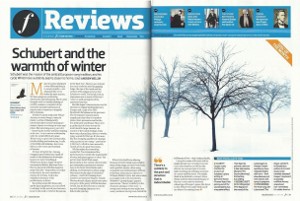Classic FM Magazine
Andrew Mellor
March 2011
Schubert and the Warmth of Winter
Schubert was the master of the Central European song tradition, and his cycle Winterreise suddenly seems closer to home
- says ANDREW MELLOR
Many of us have glimpsed a very different Britain in recent months - one whitened like never before by snow and ice. It's been magical, enchanting, obstructive and infuriating. But it's also brought with it a healthy dusting of earthly wisdom: a reminder of the awesome strength and beauty of Nature and its capacity to magnify life's emotions.
Schubert's great song-cycle Winter Journey is many things: a story in music, a series of thematically interlocked pieces and twenty-four miniature masterclasses in writing for voice and piano. But saturating every part of it - veneering its surface and also nestling at its core - is our curious relationship with the varied effects of Winter. Winterreise, to give it its German title, is both chilling and embracing. It tells of hardship and isolation, but it also offers us the wisest and warmest of lessons.
At least, it has for me - having wrapped myself these last couple of weeks in the delicate but forthright beauty of Winterreise from a singer I'd never encountered before. Baritone Peter Harvey has lived with this music most of his life - long before, he writes in the sleeve, he ever considered singing for a living. And in the weathered intimacy of his performance, it shows.
Recording songs like these with up-to-date equipment, you can afford to whisper in the ears of your listeners. Gone is the need to 'aim for the person in the back row'. Harvey uses not just his vocal cords but also his gasping lungs, the tips of his teeth and the surface of his tongue to let us into Schubert's world. You're left with an impression not so much of Harvey's 'voice', but of an imprint of his emotional journey.
But the singer's masterstroke was his decision to engage keyboardist Gary Cooper and a copy of an 1823 Brodman fortepiano as his partners. The fortepiano's sound is more translucent than that of a modern piano; nmore percussive and brittle, less bellysome and broad. There isn't a uniformity of colour across the instrument's range. Instead, the texture of the sound changes, from bass notes of punching clarity to woody, tangy sounds further up. It's far more like the changing qualities of a human voice across its own range - particularly Harvey's, which is more naturally varied across its span than many.
All this makes for something wonderful. I've encountered few performances in which the sound world of voice and piano appear so close. You get far more detail than usual, particularly at low volume. But you also get tremendous mechanical momentum in the faster movements and a chilling, icy brittleness in those songs that teeter on the edge of emotional collapse - much of it coming from Cooper's no-nonsense fingers. Vocally Harvey doesn't release much inner pain and gets a little gooey with his German vowels, but he does become a convincing and changing character on a fathomable journey.
Winterreise itself is so alluring because it's both simple and complex; many of the song are built from basic and repetitive means, often using straightforward minor/major shifts to twist their colouring in response to Müller's texts. But when taken as a single work of 24 movements, Schubert's 'grand design' appears spectacular. There's a subtlety to the structure and pace of the story - a young man setting out one night into wintry isolation having been denied the fulfilment of love - that's indescribable.
Living for weeks with snow and ice might disrupt our daily lives, but it can also surprise us with its side-effects: the curious light of a snow-laden evening; the intimate acoustics of a snow-muffled street. You might think it far-fetched to connect those things with the determined beauty of Harvey's voice and the intricate colourings of Cooper's piano. But listen to this Winterreise and I think you'll see where I'm coming from.
WHY YOU'LL LOVE THIS:
- CLARITY - Cooper really clarifies the textures of Schubert's piano writing. In Gefrorne Tränen ('Frozen Tears') his picking out of the counterpoints has a toy-piano effect. Then hear his pointed cadences in Der Stürmische Morgen ('The Stormy Morning'). Enchanting but chilling.
- SEISMIC SHIFT - At Der Wegweiser ('The Signpost') the mood of the cycle begins to change. Cooper and Harvey have replaced engine with oars - their slow discovery of new colours and tempi is poignant.
- OPEN ENDING - The final song, Der Leierman ('The Organ-grinder'), is Schubertian pathos at its most acute. Is the traveller doomed? Cooper's keyboard is spookily muffled; Harvey scared and non-committal. It's colder than ice.
(scan of printed review)
